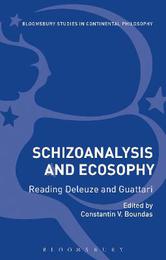
|
Schizoanalysis and Ecosophy: Reading Deleuze and Guattari
Hardback
Main Details
Description
This volume presents the concepts of schizoanalysis and ecosophy as Felix Guattari and Gilles Deleuze understood them, in interviews and analyses by their contemporaries and followers. This accessible yet authoritative introduction is written by distinguished specialists, combining testimonies from some of Guattari's colleagues at the La Borde psychiatric clinic where he practiced, with expository essays on his main ideas, schizoanalysis and ecosophy, as well as his relations with Lacan. The last section of the book deals with the subsequent creative application of those ideas by his philosophical and psychoanalytic followers situated within the contemporary moment. This collection also provides the crucial historical context of France at the time Guattari was developing his concepts, including the role of the Maoists and the significance of the political situation in Algeria.
Author Biography
Constantin V. Boundas is Professor Emeritus of Philosophy, a member of the Centre for the Study of Theory, History and Culture and an Adjunct Professor of Cultural Studies at Trent University, Canada. He is the editor of The Deleuze Reader (1993) and Deleuze and Philosophy (2006). His translations include Gilles Deleuze's The Logic of Sense (1990), Gilles Deleuze's Empiricism and Subjectivity (1991). He is also the editor of The Companion to the Twentieth Century Philosophies (2007).
ReviewsConstantin Boundas, one of Deleuze's foremost translators, disseminators and interpreters, has assembled a fine collection of essays exploring one of the most important questions of our time. Eco-philosophy extends well beyond exegesis and commentary to a radical transformation of philosophy by way of ecological thinking. The authors gathered in this volume include rising stars in Deleuze studies alongside established authors. This book will be important reading for anyone working in the environmental humanities. * Claire Colebrook, Professor of English, Philosophy, and Gender and Sexuality Studies, Penn State University, USA * This important and timely book will be useful to both those familiar with the work of Guattari and Deleuze and those coming to the fields of schizoanalysis and ecosophy for the first time. It not only carefully examines the sources of both fields in Freud, Lacan and Marx and Guattari's engagements with anti-psychiatry (at the La Borde clinic) and political activism, but also explicitly and painstakingly adds environmental ecology to the social and psychological ecologies featured in Anti-Oedipus. Tracing the development of Guattari's work beyond the earlier collaborative work with Deleuze, it goes on to explore some of the implications of schizoanalysis and ecosophy for diverse practices in the theater, schooling, art and dream therapy, and ethics. The kind of careful and cogent explications of Guattari's contributions to theory, therapy, and activism found in these essays is long overdue. * Eugene W. Holland, Professor Emeritus of Comparative Studies, The Ohio State University, USA * It is wonderful to have these new essays about Guattari's practice of psychoanalysis and the history of concepts and political controversies around it; readers of Guattari's theoretical work have been missing this, and this collection gives it to us. Beginning with Anne Querrien's fascinating reflections on the La Borde clinic in the 1960's, hearing testimony about the history of these lively debates (populated by Parisian Marxists, Catalan refugees, and feminist activists), is immensely helpful for understanding Guattari's extremely difficult philosophical writings. It is great to see Guattari's abstract conceptual apparatus tied back to clinical practices. * Jay Lampert, Professor of Philosophy, Duquesne University, USA *
|